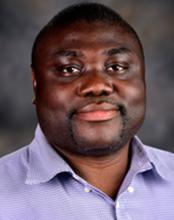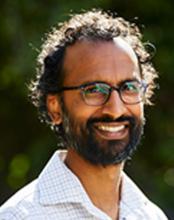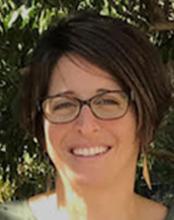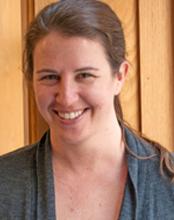
Sean Agbor-Enoh, M.D., Ph.D.
National Heart, Lung, and Blood Institute (NHLBI)
Dr. Sean Agbor was born and raised in Cameroon, Central Africa. He received his M.D. at the University of Yaounde, Cameroon and with a Fogarty International Center Scholarship went to Georgetown University in Washington, DC where he received his Ph.D. and post-doctoral training in molecular biology. He completed an internal medicine internship and residency, including as chief resident, at Johns Hopkins Bayview Medical Center and then a joint fellowship in pulmonary and critical care medicine at the NIH Clinical Center and Johns Hopkins Hospital. Formerly a staff clinician at NHLBI, he is now a Lasker Clinical Research Scholar and tenure-track investigator at NHLBI in the Pulmonary Branch with a joint appointment as a lung transplant pulmonary physician at Johns Hopkins Hospital. His Laboratory of Applied Precision Omics at NHLBI aims to develop novel approaches to detect and treat transplant rejection, the ultimate goal being to prolong the lives of transplant patients.

Benedict Anchang, Ph.D.
National Institute of Environmental Health Sciences (NIEHS)
Dr. Benedict Anchang was born and raised in Cameroon, where he did his undergraduate studies at the University of Buea. Dr. Anchang received a B.Sc. in Mathematics and M.Sc. in Biostatistics from University of Hasselt in Belgium, and Ph.D. in Bioinformatics from the University of Regensburg in Germany. He was a postdoctoral scholar in Computational Biology at Stanford University working on developing innovative methods to study biological processes at the single cell level. He is a Stadtman Investigator in the Biostatistics and Computational Biology Branch at NIEHS, with a joint appointment at the National Cancer Institute in Bethesda, Maryland. His research interests include modelling, integrating, visualizing, and optimizing spontaneous or induced effects associated with complex adverse biological processes, such as cancer or toxicity using single-cell analysis, with personalized medicine as a desired goal.

Michelle Antoine, Ph.D.
National Institute on Alcohol Abuse and Alcoholism (NIAAA)
Dr. Michelle Antoine was born and raised in Trinidad and Tobago. She earned undergraduate degrees in mathematics and biology from Spelman College and a Ph.D. degree from the Albert Einstein School of Medicine. She completed her postdoctoral training as a Miller Research Fellow and a President’s Postdoctoral Fellow at the Helen Wills Neuroscience Institute at the University of California, Berkeley. Dr. Antoine is now a Stadtman tenure-track investigator at NIAAA. Her research focuses on understanding how genetic and environmental insults alter the input to, computation in, and output of neural circuits to promote abnormal brain function and behavior.

Alexander Cartagena-Rivera, Ph.D.
National Institute of Biomedical Imaging and Bioengineering (NIBIB)
Dr. Alexander X. Cartagena-Rivera grew up in Bayamón, Puerto Rico. He received a bachelor’s degree in Mechanical Engineering from the University of Puerto Rico, Mayagüez and his Ph.D. degree in Mechanical Engineering from Purdue University. He completed a Post-Doctoral IRTA Fellowship at the NIH. He is now an Earl Stadtman Tenure-Track Investigator and chief of the Section on Mechanobiology at NIBIB, where his laboratory research focuses in understanding the cellular and tissue molecular-mechanical regulation and development of advanced Atomic Force Microscopy tools for cancer biology and hearing research.

Jiyeon Choi, Ph.D.
National Cancer Institute, Division of Cancer Epidemiology and Genetics (NCI DCEG)
Dr. Jiyeon Choi received her B.S. from Ewha Womans University, M.S. from Korea University in Seoul, Korea, and Ph.D. from Rutgers University. In 2011, she joined NCI DCEG as a postdoctoral fellow in the Laboratory of Translational Genomics, where she was promoted to research fellow in 2016 before being appointed as an Earl Stadtman Investigator in 2019. Her main research focuses on lung cancer, the most common cause of cancer death affecting diverse populations worldwide for the past several decades, with more than half of cases occurring in less developed nations. Lung cancer of never-smokers also occurs more often in Asian women. Her goal is to identify susceptibility genes and genetic variants contributing to lung cancer risk in the general population, especially in those who never smoked. She will also identify environmental factors predisposing to lung cancer of never-smokers by deconvoluting somatic mutation signatures.

Brenda Curtis, Ph.D.
National Institute on Drug Abuse (NIDA)
Dr. Brenda Curtis grew up in East St. Louis, Illinois. She was a biology major at the University of Illinois, Urbana-Champaign where she also received her Master of Public Health degree. She completed her Ph.D. at the Annenberg School for Communication, University of Pennsylvania. Before joining NIDA where Dr. Curtis is a tenure-track investigator, she was an Assistant Professor at the Perlman School of Medicine, University of Pennsylvania, in Psychiatry-Addictions. The overall objective of her research is translational, leveraging social media and big data methodology to form the development, evaluation, and implementation of technology-based tools that address substance use and related conditions such as HIV/AIDS.

Emmie de Wit, Ph.D.
National Institute of Allergy and Infectious Diseases (NIAID)
Dr. Emmie de Wit grew up in Heerlen, the Netherlands. She received a Ph.D. in virology from Erasmus University Rotterdam in the Netherlands. She moved to the Laboratory of Virology at the Rocky Mountain Laboratories in Hamilton, Montana (part of NIAID) to complete postdoctoral training in the Biosafety Level 4 laboratory there. In 2019, she became a tenure track investigator in the Laboratory of Virology. Her research focuses on the pathogenesis of emerging respiratory viruses such as Nipah virus. Her lab combines in vivo pathogenesis studies and molecular analyses with the aim of identifying molecular determinants of severe respiratory tract disease within the virus and the host.

Andrea Marzi, Ph.D.
National Institute of Allergy and Infectious Diseases (NIAID)
Dr. Andrea Marzi was born and raised in southern Germany. She received her B.Sc., M.Sc. and Ph.D. in Virology from the Friedrich-Alexander-University Erlangen-Nürnberg. Her postdoctoral work led her to Winnipeg, Canada before joining the Laboratory of Virology at the Rocky Mountain Laboratories (part of NIAID) in Hamilton, Montana. She became an Associate Scientist before her current appointment as a tenure-track investigator. Her research program focuses on the immunobiology of highly pathogenic viruses and the development of vaccines and therapeutics.

Meera Murgai, Ph.D.
National Cancer Institute, Center for Cancer Research (NCI CCR)
Dr. Meera Murgai grew up in Herndon, Virginia. She received her B.S. in Biology and Computer Science at the University of Mary Washington. She obtained her Ph.D. in Experimental Pathology at the University of Virginia, where she studied perivascular cell plasticity in primary tumor angiogenesis. She joined NCI CCR for postdoctoral research on perivascular cell function in pre-metastatic niche formation. She is now an Earl Stadtman tenure track investigator in the Laboratory of Cancer Biology and Genetics at NCI CCR where her research focuses on the role of stromal cells, including perivascular cells, fibroblasts and mesenchymal stem cells in metastatic microenvironments.

Hendrikje Nienborg, M.D., Ph.D.
National Eye Institute (NEI)
Dr. Hendrikje Nienborg was born in Freiburg, Germany. She received a Master in Neuroscience from the University of Oxford, UK, and her medical and doctoral degrees from the Ludwig-Maximilians University in Munich, Germany. She conducted postdoctoral work at NEI and, funded by a K99 award, at the Salk Institute for Biological Studies. Supported by an ERC starting grant she led a research group at the University of Tuebingen, Germany, before joining NEI as a tenure track investigator. Her research uses computational, behavioral, pharmacological, optogenetic and large-scale electrophysiological approaches to uncover how visually guided decision-making is influenced by non-visual context, such as motivation, behavior or learning, in the healthy mammalian brain and to improve our understanding of how these mechanisms fail in psychiatric and neurological diseases.

Meru Sadhu, Ph.D.
National Human Genome Research Institute (NHGRI)
Dr. Meru Sadhu was born in Canada and grew up in the Seattle area. He got his bachelor’s degree in Biology from Caltech, a Ph.D. in Molecular and Cell Biology from UC Berkeley, and was a postdoctoral researcher at UCLA. He then became a Stadtman Investigator at NHGRI. His lab generates large numbers of engineered genetic variants in parallel, to study their consequences and improve our understanding of the relationship between genotype and phenotype.

Nadine Samara, Ph.D.
National Institute of Dental and Craniofacial Research (NIDCR)
Dr. Nadine Samara was born in New York City and has lived in Lebanon, Saudi Arabia and the United States. Upon graduating from the American University of Beirut with a B.S. in Chemistry, she returned to the United States and obtained a Ph.D. in Molecular Biophysics from The Johns Hopkins University School of Medicine. She did postdoctoral research as an NIGMS-PRAT Fellow at NIH. In 2015, Dr. Samara became a staff scientist at NIDCR, where she is now an Earl Stadtman Investigator and Chief of the Structural Biochemistry Unit. The Samara lab uses structural and biochemical methods to study how a diverse family of enzymes termed glycosyltransferases modify proteins and lipids with glycans (or polysaccharides) that influence the host-microbe interface within the oral cavity and play an important role in health and disease.

Nirali Shah, M.D.
National Cancer Institute, Center for Cancer Research (NCI CCR)
Dr. Nirali Shah was born in Chicago, Illinois and grew up in the southwest suburbs of Chicago. She enrolled in an early acceptance pre-professional degree program at the University of Illinois at Chicago and received her M.D. from the University of Illinois at Chicago, College of Medicine. She did a Harvard Internal Medicine-Pediatrics residency, followed by a Pediatric Hematology-Oncology fellowship in the NCI-Johns Hopkins Hospital training program. At NCI, she trained as a clinical researcher in the Pediatric Oncology Branch and is now a Lasker Clinical Research Scholar and tenure-track investigator. The primary aim of her research program, the Hematologic Malignancies Section, is to implement cutting-edge, early-phase clinical trials to develop novel therapies for high-risk hematologic malignancies with a specific focus on advancing immunotherapy. She is also the NCI-site fellowship director of the Pediatric Hematology-Oncology Fellowship program.

Deirdre Tatomer, Ph.D.
National Cancer Institute, Center for Cancer Research (NCI CCR)
Originally from California, Dr. Deirdre Tatomer received her B.S. in Chemistry from the University of Virginia and her Ph.D. in Molecular, Cell, and Developmental Biology from the University of North Carolina, Chapel Hill. She was a postdoctoral fellow at the University of Pennsylvania where she discovered that the Integrator complex, known for its role in snRNA 3’ formation, also functions to attenuate transcription of more than 800 protein-coding genes by cleaving nascent transcripts. As a Stadtman tenure track investigator in the RNA Biology Laboratory at the National Cancer Institute (NCI), she planned to study how this newly discovered function of Integrator is regulated. She also planned to carry out high-throughput screens to determine how other inducible genes are regulated. Sadly, Dr. Tatomer passed away on December 6, 2020, before she could embark on this next adventure in a blossoming scientific career.

Emily Vogtmann, Ph.D.
National Cancer Institute, Division of Cancer Epidemiology and Genetics (NCI DCEG)
Dr. Emily Vogtmann was born and raised in Grand Rapids, Michigan. She obtained undergraduate degrees in biochemistry/molecular biology and Spanish from Michigan State University, an M.P.H. in international health epidemiology from the University of Michigan, and a Ph.D. in epidemiology from the University of Alabama at Birmingham. Her postdoctoral work was conducted in the Metabolic Epidemiology Branch of NCI DCEG where she is now a Stadtman tenure-track investigator. Her research focuses on the association between the human microbiota, cancer risk factors, and cancer risk in addition to risk factors for head and neck and lower gastrointestinal cancers.

